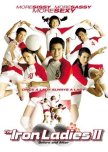
Je conseille «Paradise Kiss» à tous ceux voulant regarder une romance légère. Avec des personnages intéressants et tous très différents les uns des autres, son exploration de la mode et de la création de celle-ci, une belle leçon de vie, la chose que je regrette la plus, est que ça ne soit qu'un film, et non un drama, où on aurait pu avoir le temps de mieux connaître chacun des personnages. J'ai vu ce film quelques fois, et pourtant, je n'ai pas hésité à le revoir encore, et ce fut un plaisir !
°~°~°~°~°~°~°~°~°~°~°
Avis Complet:
https://lamagiedeshistoires.wordpress.com/2024/02/27/fevrier-2024-en-rafale-dramas-films/
Esta resenha foi útil para você?

«Decibel» est un film exaltant, qui tient en haleine tout au long, autant avec ces scènes d'action, que par ses flashbacks du passé qui jette la lumière sur un événement tragique du passé. Aucune longueur déplaisante avec ce film ! Avec des acteurs principaux ou non, qui ont tous donnés une excellente performance, certains dans des rôles très différents de ceux habituels, j'ai trouvé ce film excellent ! Je le recommande chaudement !
°~°~°~°~°~°~°~°~°~°~°
Avis Complet:
https://lamagiedeshistoires.wordpress.com/2024/02/27/fevrier-2024-en-rafale-dramas-films/
Esta resenha foi útil para você?

Different Story from Manga but awful Lead
As usual, Live Action has a different story, but this different storyline is not that crisp. Tatsuya's actor was atrocious in the beginning! I don't know if it's a Japanese thing to act like that, but they were awful. It's funny in manga and anime, but those expressions won't fit well with real-life actors. The Gang members were also styled in uniforms, which Kilihito doesn't have in the manga, but they added them for some reason.The good part was that they added more screen time for Uncle and Aunty, they're quite wholesome. Also, Kazumasa Big Bro was cast perfectly. That guy nailed the role at 99% and minus 1 percent for sass. The extra fighting didn't make much sense as they were not logically thinking, I think Out manga is way better, and the characters actually behaved in more rational manner rather than 6 guys taking on 50 guys, which is atrocious.
I think the movie is solid 7, with some good scenes, but as a manga reader, you'll be disappointed.
Esta resenha foi útil para você?

Yoru ga Aketara, Ichiban ni Kimi ni Ai ni Iku
0 pessoas acharam esta resenha útil
Esta resenha pode conter spoilers
J'ai adoré comment Akane et Seiji ont tous les deux changés la vie de l'autre. L'évolution que l'autre a créé dans leur propre vie. Et il faut dire que les différentes peintures de Seiji sont tout simplement magnifiques ! Mais s'il y a une chose que je regrette de ce film ? La fin. Comme bien souvent, j'aurais aimé en voir un peu plus, plutôt que de rester sur une fin plus 'ouverte'.....
°~°~°~°~°~°~°~°~°~°~°
Avis Complet:
https://lamagiedeshistoires.wordpress.com/2024/02/27/fevrier-2024-en-rafale-dramas-films/
Esta resenha foi útil para você?

Short and sweet
A short and sweet love story, with a little bit of horror, tragedy, and forgiveness. I was impressed by the ghost—I wasn't expecting the 'horror' to be scary, but the ghost successfully creeped me out, which I loved. This is a perfect show for when you're short on time, and want a brilliantly performed bit of everything. I would love to see it extended into a series.Esta resenha foi útil para você?

Slightly disappointed expectations but an enjoyable watch
I watched this for Karry Wang. The trailer looked good, but the movie itself was... not quite what the trailer made me expect?The plot is pretty straightforward and easy to follow, the acting or rather, perhaps characters/characterization, left me skeptical and baffled at times. This is a decent, enjoyable watch (and if you find yourself disliking/hating it, have fun hate-watching it!) but I had the hardest time with the cinematography. I do not understand the style of cutting some scenes in this particular way, it adds effect, sure, but it confused me in a few places because I wasn't sure if anything was a flashback. Also not a fan of using a fish/wide lens towards the end because it removed me from the immediacy? *shrug*
tl;dr, not the quality/depth I was expecting but an interesting premise with a decent execution. If you're also here for Karry Wang and got 1hr 53mn to spare... why not
Esta resenha foi útil para você?

"Not yet!"
At 83, director Kurosawa Akira showed his creative drive was still going strong. However, he didn’t get his wish to die on set behind the camera on this his final film. What he did, was give us a film with a main lead who in many ways stood in for him and his desires and contemplative messages. The film might have been loosely based on Uchida Hyakken’s novel but it felt like watching Kurosawa take his final bow.In 1943 Professor Uchida greets his class and tells them that he is resigning in order to write full-time. His students are devoted to him and tell him they will continue to follow him. They help the professor when he and his wife move into a larger home which later ends up catching fire in an air raid. The couple is relegated to a small shack with a few meager possessions afterwards. The students begin work on a plan to have a better home built for the professor. To boost the professor’s morale when he regrets living the life of a beggar, they hold a birthday party for him called the Not Yet Feast on his 61st birthday. The play on words comes from the game hide and seek when children would yell, “are you ready?” and the response would often be “not yet!” or madadayo. Though provisions were few, the students and professor had a raucous time at the celebration. “Are you ready to die?” “Not yet!”
“Did that just go over their heads?”
Kurosawa’s work came across as uncharacteristically hopeful in this film. The professor was described as pure gold. Eccentric, imaginative, and a prankster, the students loved him. The students were unequivocally kind and devoted to him. Whereas most Kurosawa leads had to face grueling trials in order to have character development, the Professor came fully and nearly perfectly formed. The pessimistic and deeply flawed people were missing as well as the tumultuous inner struggles. Even the students whose names were barely mentioned were deeply kind and loyal. Unlike earlier films with biting social commentary, the historical events in Madadayo were a thin construct that had minimal impact on the characters. The hardships were briefly alluded to and overcome, unlike Kurosawa’s usual criticisms surrounding the war and post war struggles. It was if Kurosawa said, “I’ve already covered that.”
“Congratulations should be short. Eulogies should be long.”
In each of his dwellings, the Professor sat in his doorway and wrote. There were no battles or betrayals, the most tragic event in the film was when a cat went missing. This film focused on the Professor’s interior musings and the interiors of his homes and the banquet halls where the Not Yet Feasts were held. Despite his insistence on an almost hermit-like existence with signs that ranged from “The temple where guests are forbidden” to roughly translated, “Whaddya want?” the Professor was nearly always surrounded by adoring students. When the Professor needed a house, the students made it happen. When the Professor’s cat went missing, they beat the bushes to find the friendly feline. In most Kurosawa films, everyone needed to watch their backs. In Madadayo, it was the nice being nice to the nice, injected with gentle humor and wisdom.
“The flowing river never stops and the water is never the same as before. The bubbles that float in the pools, now vanishing, now forming are not of long duration.”
After I recovered from the shock of realizing that everyone in the film was affectionate and generous to each other, I settled in and enjoyed the story. Kurosawa’s film style veered closer to Ozu’s than his own. Few scenes had his three deep perspective with action going on in the foreground, middle, and background. People were often sitting in a circle on the floor talking. There was a beautifully shot seasonal montage with the small shack going through fall, winter, and spring. The characters could have used improvement. The students’ personalities were never developed and the background wife never received a name. The cat even had a name, but not the wife! No mention was made of what the German language professor wrote that was so popular.
“That will be your calling, the work you put your heart into.”
What Madadayo did give us was different generations respecting and caring for each other. Kurosawa and Uchida were both facing death unflinchingly. This was not the time for fighting, but a time of introspection and peace while also contemplating the legacy of their work. The Professor encouraged the grandchildren of his students to find their treasure and to work hard for it, much as Kurosawa had.
Despite the utter lack of conflict, I enjoyed Madadayo. Every once in a while, I need a film that envelopes me in warmth and laughter. Perhaps that’s what Kurosawa needed as well. I was pleased when I saw Kurosawa’s red glow in the last scene and beautiful, tranquil clouds appeared. Then my eyes welled with tears when I realized it would be the last time for those trademark elements. If someone had asked Kurosawa if he was ready to stop creating or studying film, I think his answer would have been, “Not yet!”
26 February 2024
Esta resenha foi útil para você?

The struggle of LBGTQ+ people and the representation of stereotypes in Thai cinema (II)
'The Iron Ladies 2' ('Satree Lek 2') is the sequel to the surprising success of a gay volleyball team, having problems with their success and fame, and the way they reunite after breaking up, due to creative differences. .Youngyooth Thongkonthun repeats as director, but in the script Sayombhu Mukdeeprom joins Jira Maligool, to take up the story while the members of the volleyball team made up of homosexuals, kathoey (transsexual people) and a cisgender, meet to participate in another tournament.
when the royal team competed and won the national championship in Thailand. The two main characters, Mon and Jung, play two gay transgender women, who are constantly overlooked by volleyball coaches because of their appearance.
However, when Bee takes the reins of a local team after changing coaches, the call is issued to try out for a new team. When Mon and Jung are selected, most of the former players quit, leaving the coach in a difficult situation.
Mon and Jung are then forced to enlist the help of other gay and transgender friends they used to play volleyball with in college. These new players include Wit, who has not told his fiancée that he is gay, Pia, a transgender dancer, and Nong, a gay army recruit. When the competition begins, all but one of the players on the team are gay or transgender.
Due to their appearance on the pitch, many of the match officials intend to exclude the team, soon dubbed "The Iron Ladies", from the tournament. However, seeing the popularity of the team among the crowd will soon change their minds.
In the film's closing credits, the real "The Iron Ladies" are shown as they were at the time of the film's making.
The cast includes Sujira Arunpipat, Kokkorn Benjathikoon, Anucha Chatkaew, Surapun Chawpaknam, Shiriohana Hongsopon, Hathairat Jaroenchaichana, Giorgio Maiocchi, Peter Maiocchi, Chaicharn Nimpulsawasdi, Jesdaporn Pholdee, Phomsit Sitthijamroenkhun, Sutthipong Sitthijamroenkhun, Sahaphap Tor , Aphichart Vongkavee.
Note: The review of the original film of 'The Iron Ladies' 2000 can be found, in MDL, on the page dedicated to this film on said platform.
Esta resenha foi útil para você?

The struggle of LBGTQ+ people and the representation of stereotypes in Thai cinema (I)
'The Iron Ladies' ('Satree lek' - 2000) is a comedy-drama film written by Visuttchai Boonyakarnjawa and Jira Maligool.Based on the true story of a Thai men's volleyball team competing in the 1996 national championship with a squad made up primarily of gays and kathoey (transgender people), the award-winning film explores the struggles that are still present in the Thai LGBTQ+ community through through comedy, despite Thailand's international image as a country open to gay and transgender people.
In the greatest of storytelling traditions, Youngyooth Thongkonthun's debut feature is a true fairy tale with a happy ending, and marked a milestone in LGBTQ+ representation in the media, resonating recognition from international film festivals like the Festival Toronto Film International and several others.
Set in 1996, two gay amateur volleyball players, Chai (Jesdaporn Pholdee) and Mon (Sahaphap Tor) seek to participate in a championship despite being discriminated against.
Mon, who becomes the leader of the team, was a very talented player who constantly failed to be selected for various teams because he was gay. Chai, Mon's best friend, also experienced the same treatment but was always optimistic about things.
Their chance comes when Coach Bee is selected to form a winning team and she announces that the team will be open for everyone to try out. But when he selects Chai and Mon to be part of the team, some of the homophobic players quit in protest.
Bee then asks Mon to find some of his friends to join the team. They select Nong, a gay army sergeant; Pia, the transsexual star of a cabaret show; and Wit, whose parents don't know that their only son is gay.
Written by Strand Releasing. 'The Iron Ladies stars Jesdaporn Pholdee, Sahaphap Tor, Ekachai Buranapanit, Giorgio Maiocchi, Chaicharn Nimpulsawasdi, Kokkorn Benjathikoon and Anucha Chatkaew.
Cinematography was handled by Jira Maligool and editing by Sunij Asavinikul.
Most of them are gay and kathoey, except for one cishet (cisgender and straight) man who struggles to be accepted into the team. All of them must find their inner strengths and come together to face these challenges and participate in the national championship.
Through humor, Thongkonthun touches on sensitive topics that would otherwise have been difficult to cover at the end of the last century and the beginning of this one. It was then the era of depicting homosexuals and transgenders in the media under the old-fashioned cliché of the comic friend or villain, which even today persists on Thai television, but The Iron Ladies reveals the depth of these generally superficial characters.
Based on stereotypical representations of homosexuals (very flamboyant, feminine, happy, fearless), the film uses clichés that were common in the 2000s and are still prevalent today, and takes the stereotypes, gives them depth and appropriates them.
The film stands out for reflecting the struggle of LBGTQ+ people: while the team faces various challenges, each member of the team represents, through their own story, a societal problem that the community faces.
The cast does not fail to make their characters relatable and real within their banal and limited representation, as they mimic the tropes surrounding the representation of LGBTQ+ people in the early 2000s.
Through silly or quick comments, the film's dialogue skillfully addresses the struggles and hurtful comments prevalent in society towards LGBTQ+ people. Through absurd but witty scenes, the characters reflect and talk about love interests, being loved as a transgender person, buying items at a market, making friends, participating in sports, and being discriminated against. All this wrapped in a background of comedy and extravagant shots with vibrant electro music.
'The Iron Ladies' manages to generate controversy and reflection among (inter)national audiences about the representation and behavior towards the LGBTQ+ community.
However, the film is a predictable and over-the-top cliché in every way. Is it worth our attention? Absolutely yes, as it is a piece of history and contextualizing it will give you another view of the stereotypical image of Thailand. However, be aware of the large amount of hyper-shouting.
Note: The review of the sequel to 'The Iron Ladies' 2003 can be found, in MDL, on the page dedicated to this film on said platform.
Esta resenha foi útil para você?

Esta resenha pode conter spoilers
I swear they turned Sarah into Jesus....
I first came to know about this film around 2016/17 when I first read the novel "A Little Princess." Like other classics ("Pride and Prejudice," "Wuthering Heights," "Anne of Green Gables," etc.), I like watching all the different adaptations to see how the story can be interpreted differently. For "A Little Princess," I watched the 1917 silent film, the 1939 Shirley Temple movie, the 1985 anime, the 1986 British miniseries (the most faithful), the 1995 American film (my personal favorite), and the J-drama "Shokojo Seira" (interesting and I would recommend it). Yes, there's a lot. The Filipino version alluded me. I was unable to find anywhere, let alone with subtitles. Well, I finally found it but....Unfortunately, I feel like I set up this movie to fail. I had built it up in my mind over the last several years. I believe I would've had the same complaints, but it feels like I was let down personally... Anyway, with that out of the way, let's get on to the issues.
The movie is set in 1890 England with the school being a castle in the countryside instead of a modest home on the streets of London. It being a Filipino movie, this seems strange at first but you get used to it quickly. The first forty minutes is dedicated to Sarah's school life, which I feel takes too long and focuses too much on her schoolmates. Besides Sarah, the other child actors aren't very good and it's sometimes painful to watch. The movie picks up slightly with Sarah's fall from grace, but soon becomes crazy with the last twenty or so minutes.
My main issue with the movie is Miss Minchin. Not the acting, but the writing. She has no proper motivations for hating Sarah at all, which would be fine if she doesn't have a "redemption" at the end. I mean redemption very loosely because all she does is thank Sarah for not sending her to jail... And this is what I mean by them turning Sarah into Jesus. The movie has a distinct religious undertone. I believe Filipinos are very heavily Catholic so this makes sense. However, the religion becomes a problem at the end of the film. Sarah grants forgiveness to those who wronged her without anyone receiving punishment. It's fine to teach children to forgive like Jesus, but that should come hand-in-hand with justice (if possible).
The movie makes several other changes to the source material. It takes inspiration from the anime (which was very popular in the Philippines). If you've seen the anime, you'll be able to spot the references in the movie. These changes and other small cultural changes didn't bother me as adaptations need changes. To conclude, I mostly enjoyed this movie until the end. The ending just annoyed me too much!
Esta resenha foi útil para você?

Great human story, powerful performances and thought-provoking messages.
A large lake in a provincial city. A derailed train car at the bottom of a tunnel where two children, Mugino Minato (Kurokawa Souya) and Hoshikawa Yori (Hiiragi Hinata), play while mentioning the existence of a monster whose brain has been changed into that of a pig. An 11-year-old elementary school student who cannot get over the recent death of his father. A single mother who runs a laundry and loves her son more than anything. A close mother-son relationship. A teacher, Mr. Hori Michitoshi (Nagayama Eita), worried about his students. Childhood innocence at its best. A scandal involving low-life women in which the professor seems to be entangled. Small and large fires here and there. A school principal erratic in her actions and decisions after (causing?) the death of her grandson in a car accident. Professor's colleagues who appear to be hiding something. The teacher's girlfriend who has begun to doubt him...Although it seemed like a typical fight between children, the residents and the media are dragged into a drama that unfolds when the main parties involved make contradictory statements.
These are the main elements with which the famous filmmaker Koreeda Hirokazu weaves in '怪物' ('Kaibutsu'/Monster'), a virtuoso and labyrinthine drama with the soul of a puzzle, a brilliant film with a great human story, powerful performances and messages that They invite reflection.
When Minato begins to behave strangely, Saori (Ando Sakura), his parent, senses that something is wrong. Discovering that the person responsible for all this is a teacher, he bursts into the school demanding to know what is happening. But as the story unfolds through the eyes of the mother, the teacher and the boy, the truth slowly comes to light.
With the same fluidity, forcefulness and narrative naturalness that characterizes the filmmaker's work, the film is worthy of being enjoyed by the auteur cinema audience, but it could even appeal to a broader audience due to its genre features, its complicated structural dynamics and the shocking message that the story contains.
The film allows us to immediately connect with personal dilemmas, existential conflicts, thematic areas and secondary characters that dance coherently around the protagonists and the main story.
The sound design, the original music (which I will return to at another time), the editing and photography by Ryûto Kondô, round out the script's discourse, making use of very interesting shots and high-flying staging solutions.
The viewer must be attentive, because the film, precise as an atomic clock and, therefore, prodigious in its virtuosity and perfection, has a misleading timeline and the selective revelation of information prevents the audience from knowing where events are heading. , because she hides her true intentions until the end.
With a defined structure, well thought out from its writing, 'Monster' promptly opens the conflicts and develops them throughout the entire plot. If something was adjusted along the way, it was that the two young protagonists did not lose much in the face of such an ensemble film.
The director tries at all times to ensure that his stories, his conflicts, do not diminish their prominence before a cast made up of established actors and actresses. That was perhaps the biggest rectification of the original script, which is not so much, if we take into account that there is too much love, too much knowledge and passion on the part of the screenwriter about the story he wanted to tell from the beginning. And the audiovisual interpretation of said story at the hands of Koreeda Hirokazu is coherent enough not to get lost in complacency or self-censorship.
Ingeniously designed, subtle and flexible, the filmmaker proposes a stimulating game to the viewer: if the truth seems clear at first, we will discover it little by little, through the points of view of the mother, the teacher and Minato, in that order. , that nothing is ever what it seems.
Skillful as always in awakening the public's empathy, Koreeda, back in his native Japan, invites us to a film that lives up to the plot intensity proposed in the script by the talented Yuji Sakamoto ('Soredemo, Ikite Yuku '('Still, Life Goes On').
In this fascinating journey from darkness to light, as it is done through the cracks left in the different points of view, we find narrative traps distributed in a well-balanced way everywhere, throughout the film story, so that In the end, the viewer becomes aware of what has happened before their eyes.
From the mother's perspective, we enter an atmosphere of suspense, fear, doubt and despair that keeps the viewer in suspense, while the filmmaker tells us Saori's concern about the anomalous behavior of her son, a fifth grade student in a local primary school, with evasive responses and no addressing of their concerns.
At the same time, he hears neighborhood gossip from his clients that points to his son's teacher being involved in a sexual scandal.
Alarmed, she searches for the causes of this strange behavior of her son that has plunged her into confusion, distrust and frustration. Masterfully, Koreeda involves us in Minato's strange antics, but at the same time leads us to feel terrified by Saori's helplessness. No matter how much he investigates and demands a convincing explanation from the school directors and teachers of what is happening, the less he understands Minato's problems.
In this interesting way of touching reality, Koreeda addresses, with depth and lucidity, school bullying, to which more and more layers of complexity are added and to which an easy solution is avoided.
The film, rich in hidden feelings, hidden frustrations and current conflicts, such as abuse in schools and previous trials, is told with great detail and care, and the late Ryuichi Sakamoto's gentle score adds an overall air of reflection and empathy, helping with the nuances rather than reloading the inks.
With a well-cared for story, full of hidden twists that are revealed with time and patience, it changes from the teacher's point of view. Mr. Hori has another version of reality. Perhaps because he is worried about his students, perhaps because he is present in every act of Minato and the rest of the students, he sees the protagonist's situation with other eyes and other nuances that are very different from how Saori perceives it.
Although this narrative arc is, in my opinion, less attractive because it tends, at times, to dramatize and moments in which naturalness is lost, its approach adds complexity to the narrative with a story that continues to be intricately crafted and therefore the use of profound comments on the teacher's ethics, the dynamics of power and the influence of the media in the formation of opinion matrices that can manipulate public opinion. Using clever metaphors to convey ideas keeps the audience's interest afloat.
Although in this new narrative strategy permeated with ambiguity, Koreeda has left intentional gaps in the first two revelations, in the third all the pieces fall into place, with a very moving emotional force, which allows, finally, to narrate the truth behind the Minato's behavior, but this only comes to light from the eyes of children, in that natural innocence and friendly complicity, which as a spirit moves the skeleton of the story: once it is detached from all its layers, it shows its true nature. nature and, in the end, it is nothing more than a beautiful story of friendship and teenage love.
It is then that we realize the poetic puzzle about childhood and its secrets, recreated with an exquisite sensitivity that has allowed Koreeda to show how difficult it is to understand the world of adolescents from the perspective of adults. As perspectives converge and conflicts close, a story of disturbing tenderness begins to emerge, about the way friendship, love, shame and rejection often live within ourselves. The way in which the viewer is led towards a deeper understanding of the characters, once again demonstrates the staunch humanism of the director.
Without being a romantic drama, the strongly suggested childhood infatuation attracts the attention of members of the LGBTQ+ community, who have seen the film as a gay drama by showing a danshoku or love between men.
And they do not sin in assuming it this way, because 'Monster' reflects on the pressure of fitting into the world, especially in the family; the doubts and insecurities inherent to self-discovery and acceptance; the anguish of rejecting sexual identity, the mental tension of hiding a secret, typical of homosexuals, especially in societies where there is still discrimination against the people who make up this human group, such as Japan, as it does not have laws that recognize marriage. homosexual. Many homosexuals will see themselves reflected in the struggles, internal and external, that the two young men go through.
This is a suggestive drama of undeniable lucidity, which combines refined ability in the use of cinematographic language with narrative solidity and intelligence when developing emotions. Its director does not skimp on feelings to give us a profound drama focused on self-acceptance, captured lyrically, to astutely examine childhood and its secrets.
The film provides a new combination of social themes and childhood that, although it is not at the level of the filmmaker's masterpieces, such as 'Nobody Knows' or 'Still Walking', does not falter like 'The Truth' or 'Broker'.
Honest, profound and hopeful, 'Monster' is one of the filmmaker's most ambitious works. Its biggest problem is that, in its desire to document the suffering of its characters, it ends up trapping the viewer in a crossfire of shocks that can make the less experienced lose the narrative thread.
Esta resenha foi útil para você?

Worth Watching
I originally wanted to watch this movie because it has some of my favorite actors and actresses in it (Song Yi, Zhang Ruoyun, Zhu Yilong, Ni Ni). I'm also a big fan of Republican Era movies and dramas.
For some of my fav actors and actresses, it ended up being like 30 seconds of screen time, which was the result of there being so many characters. I personally feel it was too many characters and it took away from the actual story and made it confusing, but that's also coming from someone who didn't grow up in China and never had a Chinese history lesson. At the same time, I totally get why the directors and creators behind the movie did it this way. It's a Chinese movie and not one that was really meant to be rolled out to international audiences. I suspect the average Chinese national wouldn't have this issue since they probably learned about all of those people in their history class lol. The point of this movie was to commemorate all of those who took part in founding the CCP, which is the reason there are so many characters and so many famous actors and actresses.
As someone who is generally uneducated about Chinese history, this was a good opener to learning more about the events of that period and how spread out the movement was. Now I'm more familiar with the names. I even paused to look up some names to learn more about their role in Chinese history and the CCP. Although it did have a lot of characters with short screen times, it did focus on a larger group of people whom the audience gets deeper insight into their lives. The film did a good job of depicting this idea of a bright future, in which the youth of China will continue to bring forth a new and better China. The interaction between the older generations and younger ones and the eventual handoff of a country is a theme within this film that I think was portrayed quite nicely. I think the film also does a good job depicting how passionate people were at the time regarding their beliefs. Overall, I think the movie was decent, I learned something and got to see my favorite actors and actresses!
Esta resenha foi útil para você?

Esta resenha pode conter spoilers
Tan Jianci shines as angsty teenage boy!
As all eyes on #TanJianci #檀建次 film debut in a dramatic male lead role for I Miss You, his career seems like it's coming in full circle with his costar from Lost. Indulgence, Karen Mok, singing the ost.I've finally had a chance to rent Lost.Indulgence from appleTV and it's such a nice gem. It's a low budget, quiet, indie coming of age film. It follows the relationships of a woman and son, Xiao Chuan, navigating the aftermath from the apparent drowning of her husband. They both had to take in the woman, Su Dan, who was injured and a unlikely friendship develops between the Su Dan and Xiao Chuan.
Tan Jianci, even at a young age, shines as Xiao Chuan. Here you can already see his knack for acting and small facial movements.
Filled with teenage angst, grownup problems, and unspoken lust, Lost.Indulgence is beautifully shot on 35mm, and remeniscent of the HK era urban narratives. Despite a rushed ending, it is still a fresh breath from all the CGI fested idol dramas.
Esta resenha foi útil para você?

boring
I like the theme of the story which starts with the apartment paradox. but then I felt bored before even getting to the middle of the film.2 hours for a storyline like this gets boring. I did a lot of skipping just to find out the important points and it turns out it's not a problem to do it.
As for the visual effects, I admit it is very good, the make up of the actors down to the small details is also good, the acting is beyond doubt. but it's the storyline that's the problem.
because it lacks depth and is just like a flash of something that is not necessary. but I enjoyed it.
Esta resenha foi útil para você?

Esta resenha pode conter spoilers
“…ing” (2003) – A Review
Direction and Cast: The film’s direction stands out, skillfully guiding the narrative. The cast delivers commendable performances, adding depth to the characters.Pacing and Explanation: While the movie touches on various aspects, it spends too much time without fully exploring them. Lingering questions arise as the plot unfolds, leaving some elements unaddressed. Unfortunately, this detracts from the overall experience.
Metaphors and Closure: The ballerina and cross guard characters serve as significant metaphors, yet their importance lacks closure. The film over-delivers without providing necessary resolutions. The cross guard, initially seemingly central, fades into the background.
Multiple Viewings: “…ing” demands multiple viewings to grasp its technical intricacies fully. I plan to revisit it, hoping for a deeper understanding. However, due to my backlog, this may take some time.
Emotional Connection: Despite its flaws, the movie fails to evoke strong emotional resonance. Moments feel forced, impacting overall engagement.
Rating: 6 out of 10 My honest assessment reflects the film’s missed potential. Limited availability on physical media or YouTube adds to the disappointment.
In summary, “…ing” offers glimpses of brilliance but falls short of its promise. If you seek a slow-paced, sweet romance, consider giving it a watch. ??
Esta resenha foi útil para você?


